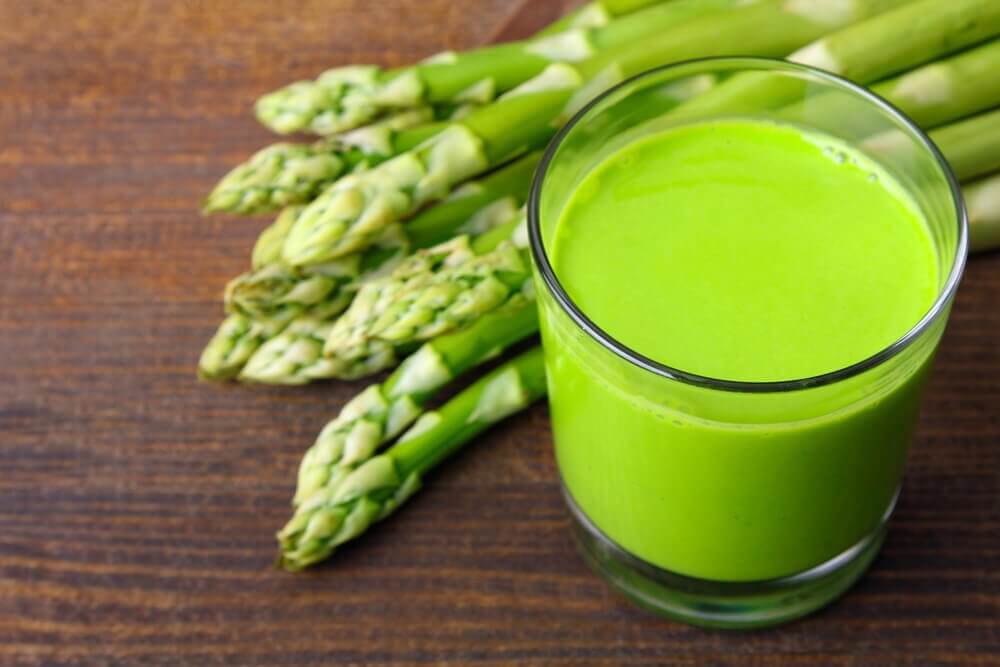8 Amazing Health Benefits of Asparagus

Delicious and versatile, there are so many benefits to eating asparagus. But do you know what these benefits are? The best time to eat asparagus is during the spring, when you can find both varieties (green and white) in grocery stores.
We’ll tell you everything you need to know about asparagus in this article.
Characteristics of asparagus
It is the stem part of the plant called Aspargus Officinalis, which can measure up to a meter and a half in height. It belongs to the same family as leek, onion and chives, even though it might not look like or taste like it.
Green asparagus is grown in warm climates, with the biggest producers based in Italy, Germany and France. Although greenhouses and cool stores allow us to have vegetables all year long, the best time to eat asparagus is in the spring. In other months, you can eat them preserved.
A brief history of the asparagus
The asparagus plant is native to the Mediterranean region, close to the Tigris and Euphrates rivers. In Ancient Egypt and Ancient Greece, people would eat asparagus and use it as an offering to the gods. It became popular all over Europe thanks to the Romans, who favored it because of its medicinal properties.
With the downfall of the Roman Empire, people stopped consuming asparagus. However, in the 12th Century, it found fame once again for its use in gastronomy. In the 17th Century, asparagus became one of the most consumed foods among the bourgeois and the upper class.
Until the 19th century, the only type of asparagus that people knew was green asparagus. However, due to a change in the way people cultivated it (underground), white asparagus started to grow. The difference is due to how much sun the plant gets (the green color is due to chlorophyll).
What are the benefits of asparagus?
According to this article from The Spanish Nutrition Foundation, asparagus (especially green asparagus) is rich in vitamins. Asparagus has been popular since ancient times and has a wide variety of benefits. Find out what they are:
1. It’s a diuretic

As it’s predominately made up of water, asparagus facilitates the removal of fluids.
- It’s recommended for people suffering from water retention, swelling or kidney problems, as stated in this study carried out by the Faisalabad University, as well as those with hypertension, as shown in this study by the University of Hokaido.
- It also provides asparagine which stimulates urine production.
- It doesn’t contain natural sodium and therefore it doesn’t increase the usual bloating you get during PMS.
2. It’s a laxative
Another one of the health benefits of asparagus is its ability to regulate intestinal transit due to the fiber it contains. This was confirmed in a study by the National University of Pusan, Korea.
- It can treat or prevent constipation, hemorrhoids, diverticular disease in the colon and irritable bowel syndrome.
- Likewise, fiber has other properties. For example, it can help lower cholesterol and improve the breakdown of sugar in the blood. This was highlighted in a study carried out by Hospital La Fuenfría in Madrid.
3. It’s an antioxidant

Having a meal that includes asparagus can be much more efficient than any beauty treatment. This is because this green (or white) vegetable contains a lot of antioxidants that have the ability to neutralize the effects of free radicals, as shown in this study by the University of Conception in Chile.
- Free radicals attack cells and cause aging.
- Likewise, it contains beta-carotene, which is good for healthy skin, as shown in this study carried out by the Veracruz Technology Institute in Mexico.
4. It promotes cognitive function
Another benefit of asparagus is that it contains a good amount of folic acid. This nutrient not only improves the health of pregnant women and helps the fetus develop, but it’s also beneficial for the brain, as demonstrated in this study carried out by the University of Chile.
- Asparagus therefore reduces the risk of cognitive impairment. It’s also believed that it can help you to get a better night’s sleep, combat insomnia and even treat depression. However, there is no scientific evidence to support these claims.
5. It’s really nutritious

Its nutritional composition is made up of vitamins A, C, E and K. It also contains chromium, oligo-elements, fiber and folic acid.
- Consuming asparagus regularly will nourish your body with lots of essential nutrients to help it function properly.
6. It’s good for your bones
People over the age of 50 (especially women who are going through menopause) and children under the age of 5 should consume more asparagus than anyone else.
- Why? Because due to the vitamin K it contains, your bones will be stronger and healthier and this will help you avoid fractures, as stated in this information taken from the US National Library of Medicine.
- Whether it be due to osteoporosis or osteoarthritis, the skeletal system gets weaker as you get older.
- Children should eat asparagus to grow and develop properly.
- Thanks to this vegetable, the osteocalcin protein (found in bone tissue) will be able to function better.
Read more: 8 Natural Ways to Strengthen Your Bones
7. It helps you lose weight?

If you’re on a diet to lose weight then you should include asparagus in your meal plan.
- A cup of this vegetable (200 g) has very few calories.
- It also contains fiber to help prevent constipation and promote the elimination of toxins.
- And if all that isn’t enough, it satisfies our hunger, and, because of this, stops us from eating out of anxiety, depression or boredom.
8. It’s antiviral
Finally, the last of our health benefits of asparagus is that it nourishes the body with nutrients that help the immune system, according to this investigation carried out by the Hislop School of Biotechnology, India. It is therefore ideal for preventing colds, the flu or any other viral or bacterial illness.
As you can see, there are many benefits to eating asparagus. Don’t hesitate to include it in your meals, make the very most of it, and enjoy its earthy flavor.
All cited sources were thoroughly reviewed by our team to ensure their quality, reliability, currency, and validity. The bibliography of this article was considered reliable and of academic or scientific accuracy.
- Sun, T., Tang, J., & Powers, J. R. (2007). Antioxidant activity and quality of asparagus affected by microwave-circulated water combination and conventional sterilization. Food Chemistry. https://doi.org/10.1016/j.foodchem.2005.10.047
- Fuentes-Alventosa, J. M., Rodríguez-Gutiérrez, G., Jaramillo-Carmona, S., Espejo-Calvo, J. A., Rodríguez-Arcos, R., Fernández-Bolaños, J., … Jiménez-Araujo, A. (2009). Effect of extraction method on chemical composition and functional characteristics of high dietary fibre powders obtained from asparagus by-products. Food Chemistry. https://doi.org/10.1016/j.foodchem.2008.07.075
- Eichholz, I., Rohn, S., Gamm, A., Beesk, N., Herppich, W. B., Kroh, L. W., … Huyskens-Keil, S. (2012). UV-B-mediated flavonoid synthesis in white asparagus (Asparagus officinalis L.). Food Research International. https://doi.org/10.1016/j.foodres.2012.03.008
This text is provided for informational purposes only and does not replace consultation with a professional. If in doubt, consult your specialist.








